Nevada cannabis dispensary hiring requirements mandate that all employees obtain a cannabis agent card through the Nevada Cannabis Compliance Board (CCB), which includes comprehensive background checks evaluating criminal history, financial responsibility, and regulatory compliance. Understanding these requirements is critical for cannabis business owners navigating the intersection of state licensing standards, federal restrictions, and operational timelines, as background check delays can jeopardize both licensing deadlines and day-to-day staffing needs.
Key Takeaways
- All Nevada cannabis dispensary employees, including budtenders, managers, cultivation staff, and security personnel, must obtain a valid cannabis agent card before starting work, with no exceptions for temporary or part-time positions.
- The Nevada CCB background check process evaluates both disqualifying offenses (which permanently bar employment) and potentially disqualifying offenses (which require case-by-case review and may be approved based on rehabilitation evidence).
- Violent felonies, drug trafficking with intent to distribute, and crimes involving fraudulent business practices typically serve as automatic disqualifiers, while simple possession offenses and minor misdemeanors may be approved after review.
- The complete agent card application process typically takes 6-10 weeks from submission to approval, requiring strategic workforce planning to avoid operational disruptions and licensing deadline issues.
- Cannabis employers must verify agent card validity before allowing employees to handle cannabis products, with CCB audits imposing penalties ranging from $5,000 fines to license suspension for non-compliance.
- Federal background check limitations mean cannabis businesses cannot access certain federal databases, creating unique compliance challenges that differ from traditional employment screening practices.
- Agent cards require annual renewal with updated background checks, meaning employers must maintain ongoing monitoring systems to ensure continuous compliance throughout employment relationships.
- Job seekers with prior criminal records should request their FBI criminal history report before applying to identify potential disqualifiers and prepare rehabilitation documentation that strengthens their agent card application.
Understanding Nevada's Cannabis Agent Card System

The Nevada Cannabis Compliance Board established the agent card system as the cornerstone of cannabis industry workforce regulation. This system ensures that every individual handling marijuana products meets state-mandated standards for trustworthiness and legal compliance. The requirements apply universally across all cannabis license types, including retail dispensaries, cultivation facilities, production facilities, testing laboratories, and distribution operations.
Who Needs a Cannabis Agent Card
Every person performing cannabis-related duties in Nevada requires an active agent card, regardless of their employment status or time commitment. The CCB enforces these requirements strictly to maintain industry integrity and public safety. Understanding who needs licensing helps employers avoid costly compliance violations.
Required positions include:
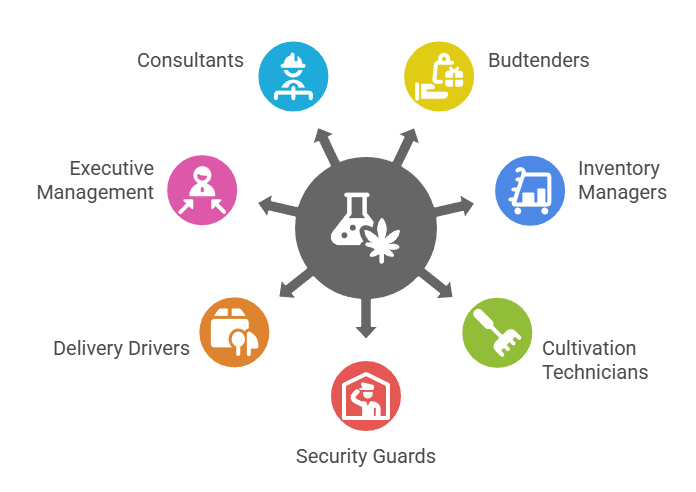
- Full-time budtenders: Customer-facing retail staff who handle product recommendations and sales transactions
- Part-time inventory managers: Personnel who track, organize, and maintain cannabis product records
- Cultivation technicians and trimmers: Workers who grow, harvest, and process cannabis plants
- Security guards: Personnel stationed at cannabis facilities to protect inventory and ensure facility safety
- Delivery drivers: Employees who transport cannabis products from facilities to customers
- Executive management: Company officers and decision-makers who oversee cannabis operations
- Consultants with facility access: Third-party professionals who regularly enter restricted cannabis areas
The only individuals exempt from agent card requirements are contractors performing non-cannabis services, licensed attorneys providing legal counsel, and government inspectors conducting official duties. However, these exemptions disappear the moment someone handles cannabis products or accesses inventory storage areas without direct supervision.
Federal vs. State Background Check Considerations
Nevada's cannabis industry operates in a unique regulatory environment where state-legal businesses cannot access federal background check systems. The FBI Interstate Identification Index and federal employment verification databases remain largely unavailable to cannabis employers due to marijuana's continued Schedule I status under federal law. This creates practical challenges for evaluating candidates with out-of-state criminal histories.
| Background Check Type | Availability to Cannabis Employers | Information Provided |
| FBI Interstate Identification Index | Not available | Multi-state federal criminal records |
| State Criminal Database Searches | Available through CCB | Nevada and participating state records |
| Fingerprint-Based Checks | Available through CCB | Identity verification and criminal matching |
| Private Background Services | Available as supplement | Variable quality multi-state searches |
The CCB conducts multi-state criminal database searches and requires applicants to submit fingerprints through state-authorized channels. Cannabis employers frequently supplement official CCB checks with private background screening services to identify potential issues before investing in the formal application process.
The Role of the Nevada Cannabis Compliance Board
The CCB serves as the sole authority for cannabis agent card issuance, replacement, renewal, and revocation throughout Nevada. Established in 2021, the CCB consolidated cannabis oversight under a single agency, replacing the previous dual-authority system where the Department of Taxation handled recreational cannabis and the Division of Public and Behavioral Health managed medical marijuana. This consolidation standardized cannabis dispensary employee screening requirements in Nevada across both recreational and medical sectors.
Disqualifying Crimes and Background Check Criteria
Nevada's cannabis agent card background check process evaluates criminal history through a tiered system. The CCB distinguishes between absolute disqualifiers, potentially disqualifying offenses requiring individualized review, and minor infractions that typically don't impact approval. Understanding these distinctions helps cannabis employers set realistic hiring expectations and assists job seekers in determining their eligibility before investing time and money in applications.
Automatic Disqualifying Offenses
Certain criminal convictions create permanent bars to cannabis employment in Nevada, with no possibility for waiver or rehabilitation consideration. The CCB maintains particular scrutiny for offenses demonstrating threats to public safety or regulatory compliance. These restrictions protect Nevada's regulated cannabis program from individuals whose criminal history suggests they pose unacceptable risks.
Automatic disqualifiers include:
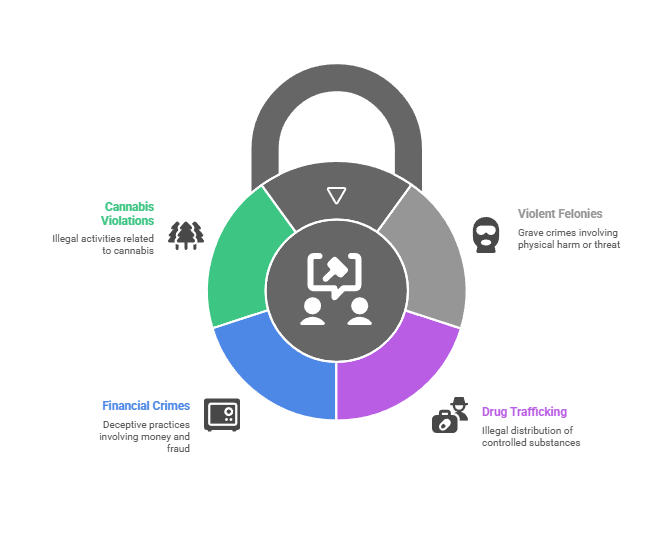
- Violent felonies: Murder, sexual assault, robbery with a deadly weapon, aggravated battery, arson, kidnapping, and felony domestic violence
- Drug trafficking convictions: Intent to distribute controlled substances outside legal frameworks or operating unlicensed cannabis operations
- Financial crimes: Embezzlement from previous employers, securities fraud, large-scale tax evasion, or fraudulent business practices
- Previous cannabis violations: Operating unlicensed cultivation facilities or diverting legal cannabis to black markets
Previous violations of state cannabis regulations permanently disqualify individuals from participating in Nevada's regulated industry. Arson convictions, kidnapping charges, and felony domestic violence incidents trigger automatic denials regardless of how much time has passed since conviction.
Potentially Disqualifying Offenses Requiring Review
Many criminal history items fall into a middle category where the CCB conducts individualized assessments. The board considers offense severity, time elapsed since conviction, rehabilitation evidence, and the specific position's responsibilities. Simple drug possession charges, particularly for marijuana in jurisdictions where it was illegal, rarely result in denials, especially when convictions occurred before Nevada's legalization.
The CCB generally applies specific time frames when evaluating criminal history:
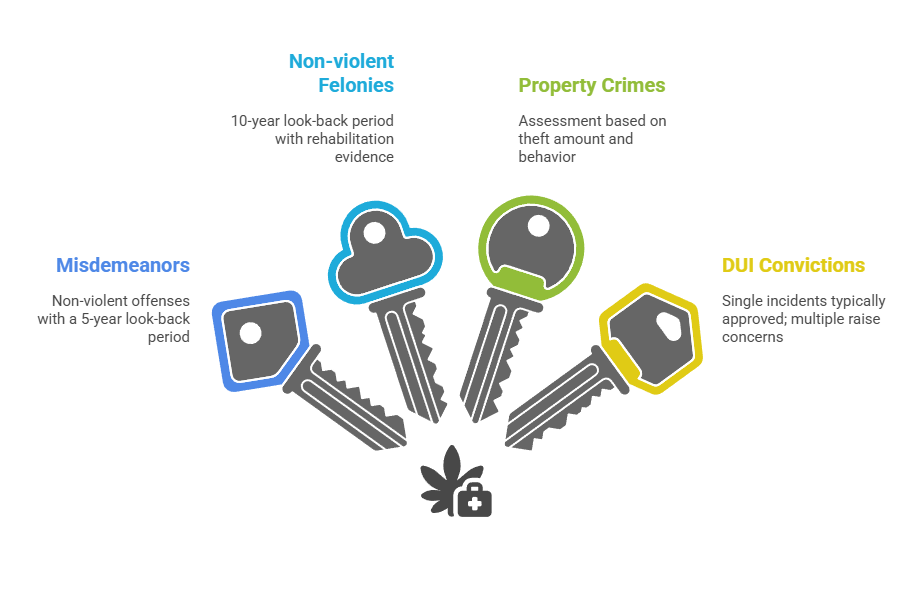
- Misdemeanors: 5-year look-back period for most non-violent misdemeanor offenses
- Non-violent felonies: 10-year look-back period with rehabilitation evidence consideration
- Property crimes: Individual assessment based on theft amount, circumstances, and subsequent behavior
- DUI convictions: Single incidents from several years ago typically approved; multiple or recent DUIs raise concerns
Non-violent property crimes like shoplifting, check fraud under $1,000, or trespassing typically receive approval when sufficient time has passed. Applicants demonstrate rehabilitation through steady employment, community involvement, or completion of court-ordered programs.
How Criminal History Is Evaluated
The CCB's evaluation framework extends beyond simple conviction records to assess an applicant's complete criminal justice history. The board investigates arrests without convictions, pending charges, probation or parole status, and deferred adjudication agreements. While arrests alone don't automatically disqualify candidates, the CCB investigates circumstances surrounding dismissed charges or cases resolved through plea agreements.
| Evaluation Factor | Impact on Application | Mitigation Strategies |
| Time since conviction | Older offenses weighted less heavily | Emphasize years of clean record |
| Rehabilitation evidence | Significantly improves approval odds | Submit program completion certificates, employment letters |
| Position-specific risks | Different roles receive different scrutiny | Apply for positions matching your background |
| Pattern of behavior | Repeated offenses raise more concerns | Demonstrate fundamental life changes |
Cannabis dispensary background check disqualifying crimes receive different weight depending on position-specific risk factors. Security positions face enhanced scrutiny for violent offenses, while accounting roles trigger deeper review of financial crimes. The CCB sometimes approves applicants with conditional restrictions, allowing employment while mitigating specific risks.
The Agent Card Application Process
Navigating the cannabis agent card application requires attention to procedural details and strict adherence to documentation requirements. The multi-step process involves employer sponsorship, electronic application submission, fingerprint capture, background investigation, and final CCB adjudication. Success depends on completing each step accurately and providing comprehensive information that demonstrates eligibility.
Step-by-Step Application Requirements
The process begins when a licensed cannabis establishment submits an agent card application on behalf of a prospective employee through the CCB's online portal. Employers must first verify their own license status remains active and compliant before sponsoring agent applications. Establishments with outstanding violations or pending disciplinary actions cannot sponsor new cards.
Application requirements include:
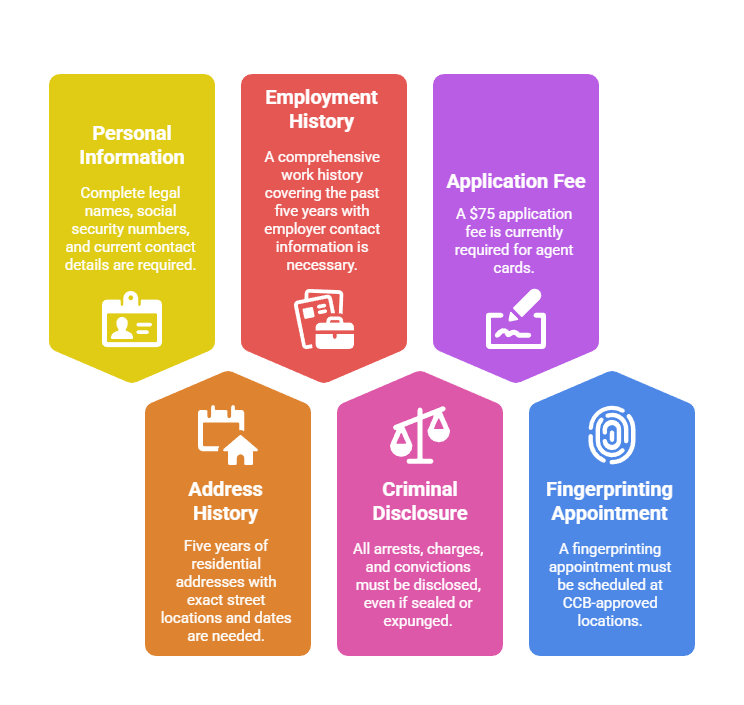
- Personal information: Complete legal names (including aliases), social security numbers, and current contact details
- Address history: Five years of residential addresses with exact street locations and dates
- Employment history: Comprehensive work history covering the past five years with employer contact information
- Criminal disclosure: All arrests, charges, and convictions, even if sealed, expunged, or occurred in other states
- Application fee: Currently $75 for agent cards (subject to periodic CCB adjustments)
- Fingerprinting appointment: Scheduled at CCB-approved locations with government-issued photo identification
Failure to disclose known criminal history—even if it wouldn't result in denial—can itself become grounds for rejection based on dishonesty concerns. Applicants should bring government-issued photo identification to fingerprinting appointments and ensure the name on identification exactly matches their application.
Timeline and Processing Expectations
Complete cannabis agent card processing typically requires 6-10 weeks from initial application submission to final approval. Applications for candidates with no criminal history and continuous Nevada residency often process in 4-6 weeks. Those requiring multi-state record verification or individualized offense reviews may extend to 12-14 weeks.
Cannabis business owners should implement strategic workforce planning that accounts for these timelines. Many successful operators maintain a continuous recruiting pipeline, beginning agent card applications for promising candidates before immediate openings exist. This ensures approved personnel are ready when positions become available.
Employer Responsibilities and Compliance Requirements
Nevada cannabis dispensary hiring requirements extend far beyond initial agent card verification. Employers face ongoing compliance obligations that persist throughout employment relationships. Establishing robust systems for verifying credentials, monitoring renewals, responding to CCB notices, and maintaining audit-ready documentation protects businesses from costly penalties.
Pre-Employment Verification Duties
Cannabis employers bear absolute responsibility for verifying agent card validity before allowing individuals to perform any cannabis-related duties. The CCB provides a real-time verification portal where employers can search agent card numbers or names to confirm current status. Employers who allow unlicensed individuals to handle cannabis products face penalties ranging from $5,000 fines for first offenses to license suspension for repeated violations.
Best practices for verification include:
- Badge systems: Physical agent cards displayed at all times during work shifts
- Digital tracking: Spreadsheets with agent card numbers, expiration dates, and verification dates
- Compliance officers: Designated personnel responsible for weekly verification checks
- Software integration: Automated alerts when cards approach expiration or status changes occur
- New hire verification: Checking CCB databases even for candidates claiming existing valid credentials
The five minutes required for verification prevents costly compliance violations and operational disruptions. Employers should verify agent cards even for experienced candidates claiming to already hold valid credentials, as card suspensions or revocations can occur between employment transitions.
Ongoing Monitoring and Renewal Management
Agent cards expire annually, requiring renewal applications that include updated background checks and fee payments. Employers must track expiration dates for all employees and ensure renewal applications begin at least 45 days before expiration to account for processing time. Employees cannot legally work in cannabis facilities with expired cards, even if renewal applications are pending.
The CCB sends email renewal reminders to both card holders and sponsoring employers 60 and 30 days before expiration. However, employers shouldn't rely solely on these notifications. Technical issues, spam filters, or employee email changes can prevent delivery, and CCB systems occasionally experience glitches.
Special Considerations for Different Cannabis Positions
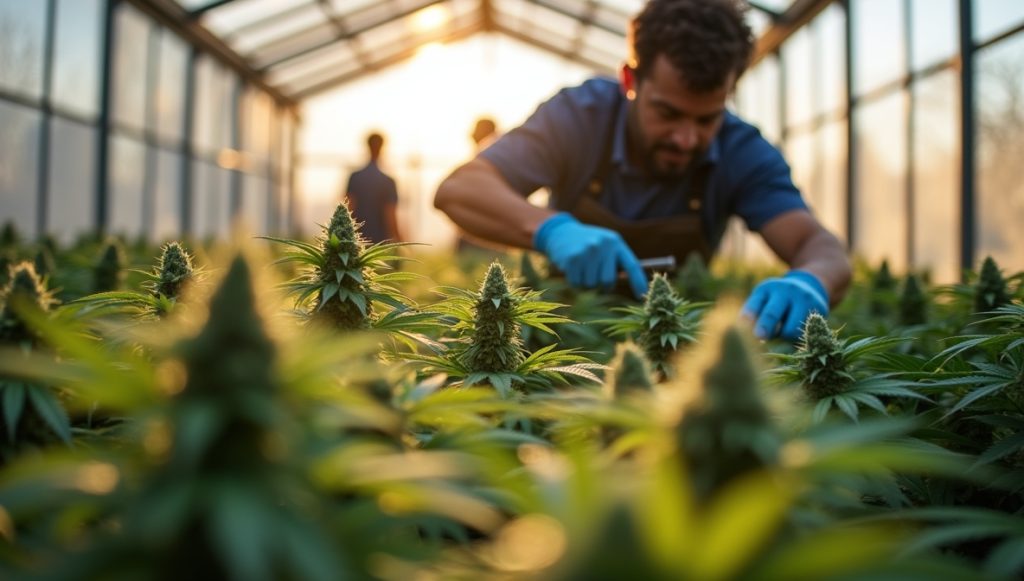
While all Nevada recreational marijuana employee screening follows the same fundamental agent card requirements, different positions within cannabis operations face varied scrutiny levels. Understanding how background evaluations differ across roles helps employers set appropriate hiring standards. Job seekers can identify positions matching their qualifications and criminal history profiles more effectively.
Dispensary Retail and Customer-Facing Roles
Budtenders and retail associates represent the public face of cannabis operations, requiring strong customer service skills alongside regulatory knowledge. Background evaluations for these positions emphasize theft-related offenses, customer interaction concerns, and compliance reliability. Applicants with prior retail theft convictions face enhanced scrutiny, though successful arguments can be made for approval when offenses occurred long ago.
Patient interaction positions in medical dispensaries receive additional attention regarding healthcare-adjacent responsibilities. While budtenders aren't medical professionals and can't provide medical advice, the CCB expects demonstrated judgment and professionalism when discussing product options with patients managing health conditions.
Cultivation, Production, and Manufacturing Staff
Cultivation technicians, trimmers, and production facility workers typically face less stringent background scrutiny than retail positions, particularly for entry-level roles. However, this doesn't mean cultivation positions accept applicants who would be denied retail cards. The same basic CCB standards apply, but individualized reviews may weigh factors differently based on position-specific risks.
Position-specific considerations include:
- Extraction technicians: Enhanced safety scrutiny due to volatile solvents and flammable materials
- Production specialists: Equipment operation safety and workplace violation history review
- Master growers: Inventory tracking responsibilities requiring financial crime evaluation
- Cultivation managers: Regulatory compliance oversight demanding highest trustworthiness standards
Cannabis cultivation facility background checks function identically to retail dispensaries, but cultivation operations face unique challenges due to seasonal employment fluctuations. Cultivation facilities should maintain databases of previously approved agents who worked prior seasons and can return for future harvests.
Management, Security, and Key Personnel
Executive leadership, compliance officers, and facility managers undergo the most rigorous background scrutiny. Their decisions shape entire organizations' regulatory adherence, making their integrity paramount. Any indication of fraudulent business practices, previous cannabis regulation violations, or patterns of disregarding legal requirements in other contexts create substantial approval barriers.
| Position Type | Enhanced Scrutiny Areas | Common Approval Challenges |
| Executive Management | Financial crimes, business fraud, previous regulatory violations | Pattern of legal non-compliance in other industries |
| Compliance Officers | Accuracy standards, attention to detail, professional integrity | Previous professional license suspensions |
| Security Personnel | Violent crime history, weapons offenses, excessive force allegations | Any violent felony convictions |
| Key License Holders | Comprehensive financial history, civil litigation, regulatory compliance | Complex financial structures or hidden ownership issues |
Security personnel require special attention to violent crime history and weapons offenses. Nevada law prohibits individuals with certain violent felonies from working as security guards in any context, and the CCB applies these standards strictly to cannabis facility security.
Guidance for Job Seekers with Criminal Records
Individuals with criminal history wondering if they can work in Nevada's cannabis industry should approach the question strategically. Many successful cannabis professionals have prior criminal records, and the industry's culture often values second chances and rehabilitation more than traditional employment sectors. Preparation and honest self-assessment significantly improve application success rates.
Assessing Your Eligibility Before Applying
Job seekers should obtain their complete criminal history records before applying to cannabis positions. Memories fade and individuals frequently forget minor charges or arrests that didn't result in convictions. The FBI provides a process for individuals to request their own criminal history reports, while many states offer similar services through state police agencies.
After obtaining records, research whether specific offenses fall into automatic disqualifier categories or potentially approvable ranges. The CCB website provides general guidance, and many cannabis employment attorneys offer consultation services to evaluate individual situations.
Preparing a Strong Application
Applicants with criminal history should submit detailed explanatory letters alongside agent card applications. Effective letters proactively address offenses rather than leaving the CCB to draw its own conclusions. Strong applications combine honest explanations with compelling evidence of rehabilitation and personal growth.
Application strengthening strategies:
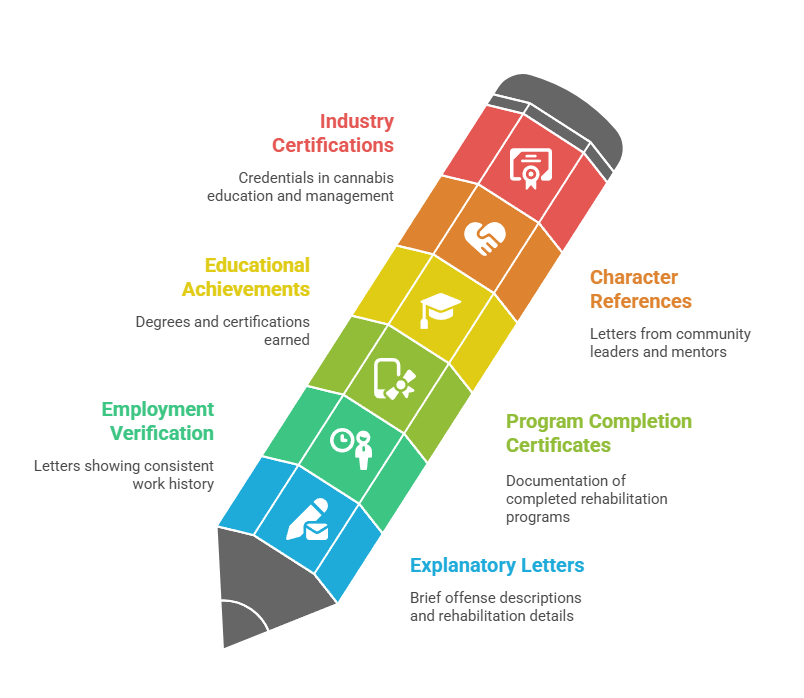
- Explanatory letters: Brief offense descriptions, responsibility acceptance, rehabilitation details, and trustworthiness demonstrations
- Employment verification: Letters from previous employers showing consistent work history since convictions
- Program completion certificates: Drug treatment, anger management, or counseling program documentation
- Educational achievements: Degrees, certifications, or vocational training completed since offenses
- Character references: Letters from employers, clergy, community leaders, or mentors
- Industry certifications: Cannabis education programs, responsible vendor training, or inventory management credentials
Some applicants benefit from completing volunteer work or obtaining industry certifications before applying. These proactive steps create additional evidence of commitment and trustworthiness that distinguishes candidates from those submitting minimal applications.
What to Do If Your Application Is Denied
Agent card denials include explanation letters detailing reasons and informing applicants of appeal rights. Applicants have 30 days from denial notice to file administrative appeals requesting CCB reconsideration. Successful appeals typically present new information not included in original applications, such as additional rehabilitation documentation or corrected criminal record information.
Administrative appeals follow formal procedures requiring written submissions and sometimes include hearings where applicants can present testimony. While appeals add costs and extend timelines, they succeed often enough that applicants with legitimate cases should pursue the process. Many appellants hire cannabis attorneys to prepare legal arguments and present cases effectively.
Conclusion
Nevada cannabis dispensary hiring requirements create a comprehensive regulatory framework designed to ensure workforce integrity while balancing rehabilitation principles with public safety concerns. Success requires cannabis employers to implement robust compliance systems covering initial verification through ongoing monitoring. Job seekers must honestly assess their backgrounds and strategically prepare applications that demonstrate trustworthiness. The investment in proper compliance protects both business operations and Nevada's regulated cannabis program. As Nevada's cannabis market continues maturing, staying current with evolving CCB requirements and maintaining meticulous documentation remains essential for all industry participants.
Frequently Asked Questions
How long does it take to get a Nevada cannabis agent card?
The complete agent card application process typically takes 6-10 weeks from initial submission to final approval. Applications for individuals with no criminal history and continuous Nevada residency often process faster in 4-6 weeks. Those requiring extensive out-of-state criminal record verification or individualized offense reviews may extend to 12-14 weeks. Processing times vary based on CCB application volume and background investigation complexity.
Can I work at a Nevada dispensary with a felony on my record?
Employment with a felony record depends on the specific offense, time elapsed since conviction, and rehabilitation evidence. Violent felonies, drug trafficking convictions, and fraudulent business practice crimes typically result in automatic denial. Non-violent felonies may be approved after individualized CCB review, particularly when applicants submit compelling rehabilitation documentation including employment verification, program completion certificates, and character references.
Do dispensary employees need background checks for both medical and recreational positions?
Yes, all Nevada cannabis employees need agent cards regardless of whether they work in medical or recreational operations. The Nevada Cannabis Compliance Board consolidated oversight of both medical and recreational cannabis in 2021, applying identical background check standards across all license types. The same agent card allows employees to work in either medical or recreational facilities.
What disqualifies you from getting a cannabis agent card in Nevada?
Automatic disqualifiers include violent felonies, drug trafficking with intent to distribute, financial crimes demonstrating fraudulent business practices, and previous violations of state cannabis regulations. Potentially disqualifying offenses requiring individualized review include simple drug possession, non-violent property crimes, and DUI convictions. These may be approved based on offense severity, time elapsed, rehabilitation evidence, and position-specific risk factors.
How much does a Nevada cannabis agent card cost?
The current agent card application fee is $75, though this amount occasionally adjusts based on CCB administrative costs. This fee covers the initial application and background check processing. Cards require annual renewal with additional fees. Additional costs may include fingerprinting service fees charged by approved collection locations, which typically range from $15-35.
Can cannabis employers see arrest records that didn't result in convictions?
Yes, the CCB's background investigation includes arrests without convictions, pending charges, and dismissed cases. While arrests alone don't automatically disqualify candidates, the CCB investigates circumstances surrounding dismissed charges or cases resolved through plea agreements. Applicants must disclose all criminal justice system interactions on applications, as failure to disclose known history can become grounds for rejection.
Do cannabis agent cards from other states work in Nevada?
No, Nevada does not recognize cannabis agent cards or similar credentials from other states. All individuals working in Nevada cannabis establishments must obtain Nevada-specific agent cards through the CCB. However, individuals moving from other states can typically use their previous cannabis experience to strengthen Nevada applications.
What happens if my agent card expires while I'm employed?
Employees cannot legally perform cannabis-related duties with expired agent cards, even if renewal applications are pending. Employers must remove employees with expired cards from cannabis-handling positions until renewals process, typically requiring unpaid leave. To prevent this situation, employers should track expiration dates and ensure renewal applications begin at least 45 days before expiration.
Additional Resources
- Nevada Cannabis Compliance Board Official Agent Card Portal
https://ccb.nv.gov/ - Nevada Revised Statutes Chapter 678B - Cannabis Control
https://www.leg.state.nv.us/nrs/nrs-678b.html - FBI Identity History Summary Check (Personal Record Request)
https://www.fbi.gov/how-we-can-help-you/need-an-fbi-service-or-more-information/identity-history-summary-checks - Nevada Department of Employment, Training and Rehabilitation - Cannabis Industry Career Resources
https://detr.nv.gov/ - National Cannabis Industry Association Compliance Resources
https://thecannabisindustry.org/resources/compliance/
